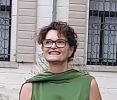Studying at the University of Verona
Here you can find information on the organisational aspects of the Programme, lecture timetables, learning activities and useful contact details for your time at the University, from enrolment to graduation.
Academic calendar
The academic calendar shows the deadlines and scheduled events that are relevant to students, teaching and technical-administrative staff of the University. Public holidays and University closures are also indicated. The academic year normally begins on 1 October each year and ends on 30 September of the following year.
Course calendar
The Academic Calendar sets out the degree programme lecture and exam timetables, as well as the relevant university closure dates..
| Period | From | To |
|---|---|---|
| Semestrino IA | Sep 28, 2015 | Nov 14, 2015 |
| Semestrino IB | Nov 16, 2015 | Jan 16, 2016 |
| Semestrino IIA | Feb 22, 2016 | Apr 16, 2016 |
| Semestrino IIB | Apr 18, 2016 | Jun 4, 2016 |
| Session | From | To |
|---|---|---|
| Sessione invernale | Jan 18, 2016 | Feb 20, 2016 |
| Sessione estiva | Jun 6, 2016 | Jul 30, 2016 |
| Sessione autunnale | Sep 1, 2016 | Sep 30, 2016 |
| Session | From | To |
|---|---|---|
| Sessione estiva | Jul 5, 2016 | Jul 6, 2016 |
| Sessione autunnale | Nov 22, 2016 | Nov 23, 2016 |
| Sessione invernale | Apr 3, 2017 | Apr 8, 2017 |
| Period | From | To |
|---|---|---|
| Festa di Ognissanti | Nov 1, 2015 | Nov 1, 2015 |
| Festa dell'Immacolata | Dec 8, 2015 | Dec 8, 2015 |
| Vacanze di Natale | Dec 23, 2015 | Jan 6, 2016 |
| Vancanze di Pasqua | Mar 24, 2016 | Mar 29, 2016 |
| Festa della Liberazione | Apr 25, 2016 | Apr 25, 2016 |
| Festa dei Lavoratori | May 1, 2016 | May 1, 2016 |
| Festa del S. Patrono S. Zeno | May 21, 2016 | May 21, 2016 |
| Festa della Repubblica | Jun 2, 2016 | Jun 2, 2016 |
| Vacanze estive | Aug 8, 2016 | Aug 15, 2016 |
Exam calendar
Exam dates and rounds are managed by the relevant Culture and Civilisation Teaching and Student Services Unit.
To view all the exam sessions available, please use the Exam dashboard on ESSE3.
If you forgot your login details or have problems logging in, please contact the relevant IT HelpDesk, or check the login details recovery web page.
Academic staff
 federica.barboni@univr.it
federica.barboni@univr.it
 luca.bochicchio@univr.it
luca.bochicchio@univr.it
 evita.calabrese@univr.it
evita.calabrese@univr.it
 monica.cristini@univr.it
monica.cristini@univr.it
 giacomo.girardi@univr.it
giacomo.girardi@univr.it
Maganuco Anna Maria Grazia Rita
 anna.maganuco@univr.it
anna.maganuco@univr.it
 sofia.piacentin@univr.it
sofia.piacentin@univr.it
 irene.reginato@univr.it
irene.reginato@univr.it
 alberto.scandola@univr.it
alberto.scandola@univr.it
Study Plan
The Study Plan includes all modules, teaching and learning activities that each student will need to undertake during their time at the University.
Please select your Study Plan based on your enrollment year.
1° Year
| Modules | Credits | TAF | SSD |
|---|
One course to be chosen among the followingForeign language B1 (CB Test)2° Year activated in the A.Y. 2016/2017
| Modules | Credits | TAF | SSD |
|---|
Latin literature (i)
One course to be chosen among the following2 course to be chosen among the following2 course to be chosen among the following3° Year activated in the A.Y. 2017/2018
| Modules | Credits | TAF | SSD |
|---|
One course to be chosen among the following3 course to be chosen among the following| Modules | Credits | TAF | SSD |
|---|
One course to be chosen among the followingForeign language B1 (CB Test)| Modules | Credits | TAF | SSD |
|---|
Latin literature (i)
One course to be chosen among the following2 course to be chosen among the following2 course to be chosen among the following| Modules | Credits | TAF | SSD |
|---|
One course to be chosen among the following3 course to be chosen among the following| Modules | Credits | TAF | SSD |
|---|
Legend | Type of training activity (TTA)
TAF (Type of Educational Activity) All courses and activities are classified into different types of educational activities, indicated by a letter.
Type D and Type F activities
Modules not yet included
Contemporary History (i+p) - II MODULO PARTE (P) (2016/2017)
Teaching code
4S02147
Teacher
Credits
6
Also offered in courses:
- Contemporary History (i+p) - II MODULO PARTE (P) of the course Bachelor's degree in Philosophy
- Contemporary History (p) of the course Bachelor’s degree in Humanities
Language
Italian
Scientific Disciplinary Sector (SSD)
M-STO/04 - CONTEMPORARY HISTORY
Period
Sem. IIA, Sem. IIB
Learning outcomes
The principal aim of this class is to analyse the most important historical issues connected with the end of first world war and the origins of totalitarian regimes in Europe and with the legacy (political and cultural) of second world war.
Program
Program: a) political, cultural and military history of IWW, b) the crisis of European democracy after the end of IWW, c) the origins of Fascism and Nazism, d) the Cold War: political and cultural impact on European societies, e) the history of Italian Republic.
Bibliografia
1. un volume a scelta tra: T. Detti-G. Gozzini, Storia contemporanea, II, Il novecento, Bruno Mondadori, A.M. Banti, L’Età contemporanea. Dalla Grande Guerra a oggi, Laterza, 2011.
2. un libro a scelta tra i seguenti:
M. Isnenghi, Convertirsi alla guerra. Liquidazioni, mobilitazioni e abiure nell’Italia tra il 1914 e il 1918, Donzelli, 2015.
J. Chapoutot, Controllare e distruggere. Fascismo, nazismo e regimi autoritari in Europa (1928-1945), Einaudi, 2015.
S. Peli, La Resistenza in Italia. Storia e critica, Einaudi, 2004 (e successive edizioni).
G. De Luna, La Repubblica del dolore. Le memorie di un’Italia divisa, Feltrinelli, 2011.
I non frequentanti dovranno aggiungere alla bibliografia sopraindicata un testo a scelta tra i seguenti:
b. R. Overy, Crisi tra le due guerre mondiali, il Mulino, 1998.
Metodi didattici: lezioni frontali, attività seminariali.
Particolarmente importante ai fini dell’approfondimento di alcune tematiche affrontate nel corso, saranno la partecipazione, nella misura di almeno il 50% degli incontri programmati, al terzo ciclo di conferenze La guerra degli italiani (febbraio-maggio 2017) e al seminario Lessico della Grande Guerra (marzo-maggio 2017). Obbligatoria sarà, inoltre, la partecipazione al terzo colloquio di Storia dell’Europa contemporanea che si svolgerà nel mese di maggio 2017.
Examination Methods
Erasmus and overseas students attending classes. Erasmus and overseas student can choose between written and oral examination. They can use books in foreign languages (English, French and Spanish).
For more details: contact the teacher during his office hours.
Career prospects
Module/Programme news
News for students
There you will find information, resources and services useful during your time at the University (Student’s exam record, your study plan on ESSE3, Distance Learning courses, university email account, office forms, administrative procedures, etc.). You can log into MyUnivr with your GIA login details: only in this way will you be able to receive notification of all the notices from your teachers and your secretariat via email and also via the Univr app.
Graduation
List of thesis proposals
| theses proposals | Research area |
|---|---|
| tesi di Glottologia, Storia comparata, Linguistica storica | ENGLISH LANGUAGE - Grammar and Syntax – Grammatik und Syntax |
| tesi di Glottologia, Storia comparata, Linguistica storica | GERMANIC LANGUAGE - Dialectology - Dialektologie |
| tesi di Glottologia, Storia comparata, Linguistica storica | HUMANITIES & SOCIAL STUDIES - HUMANITIES & SOCIAL STUDIES |
| tesi di Glottologia, Storia comparata, Linguistica storica | Indo-European languages & literatures - Indo-European languages & literatures |
| tesi di Glottologia, Storia comparata, Linguistica storica | LINGUISTICS - LINGUISTICS |
Gestione carriere
Linguistic training CLA
Student mentoring
Requisiti classi di abilitazione insegnamento
Requisiti necessari per accedere alle classi di abilitazione per l'insegnamento.
vedi allegato pdf
Inoltre, per informazioni sui 24 CFU nelle discipline antropo-psico-pedagogiche e nelle metodologie e tecnologie didattiche, si veda -> LINK
Documents
| Title | Info File |
|---|---|
|
|
pdf, it, 307 KB, 30/11/21 |
Student login and resources
Modalità e sedi di frequenza
La frequenza non è obbligatoria.
Maggiori dettagli in merito all'obbligo di frequenza vengono riportati nel Regolamento del corso di studio disponibile alla voce Regolamenti nel menu Il Corso. Anche se il regolamento non prevede un obbligo specifico, verifica le indicazioni previste dal singolo docente per ciascun insegnamento o per eventuali laboratori e/o tirocinio.
È consentita l'iscrizione a tempo parziale. Per saperne di più consulta la pagina Possibilità di iscrizione Part time.
Le sedi di svolgimento delle lezioni e degli esami sono le seguenti:
- Polo Zanotto (vicino si trova il Palazzo di Lettere)
- Palazzo ex Economia
- Polo Santa Marta
- Istituto ex Orsoline
- Palazzo Zorzi (Lungadige Porta Vittoria, 17 - 37129 Verona)

 +39 045802 8351
+39 045802 8351












































